🇦🇺 Australia
🇨🇦 Canada
🇨🇿 Czechia
🇩🇰 Denmark🇪🇪 Estonia
🇮🇪 Ireland
🇮🇱 Israel
🇮🇹 Italy
🇯🇵 Japan
🇲🇽 Mexico
🇵🇱 Poland
🇰🇷 South Korea
🇨🇭 Switzerland
🇬🇧 United Kingdom
🇺🇸 United States of Americaand more
🇦🇺 Australia
🇨🇦 Canada
🇨🇿 Czechia
🇩🇰 Denmark🇪🇪 Estonia
🇮🇪 Ireland
🇮🇱 Israel
🇮🇹 Italy
🇯🇵 Japan
🇲🇽 Mexico
🇵🇱 Poland
🇰🇷 South Korea
🇨🇭 Switzerland
🇬🇧 United Kingdom
🇺🇸 United States of Americaand more
Bisacodyl Darnytsia enteric-coated tablets 5 mg 30 pcs.
$15.50
Bisacodyl causes a laxative effect, which is manifested by softening or liquefaction of feces. The mechanism of laxative action is due to an increase in the penetration of water into the intestinal cavity and a decrease in its absorption, as well as an acceleration of intestinal peristalsis.
-
— or —
Composition and form of release
Composition
active ingredient: bisacodyl;
1 tablet contains 5 mg bisacodyl;
Excipients: potato starch, lactose monohydrate, microcrystalline cellulose, povidone, calcium stearate, methacrylate copolymer dispersion, talc, titanium dioxide (E 171), polyethylene glycol, quinoline yellow (E 104).
Release form
The film-coated tablets are enteric-coated.
Pharmacological properties
Pharmacodynamics. Bisacodyl causes a laxative effect, which is manifested by softening or liquefaction of feces. The mechanism of laxative action is due to an increase in the penetration of water into the intestinal cavity and a decrease in its absorption, as well as an acceleration of intestinal peristalsis.
An important place in the mechanism of action is occupied by the breakdown of bisacodyl in the alkaline contents of the intestine, which leads to the formation of substances that irritate the receptors of the intestinal mucosa. This leads to stimulation of intestinal peristalsis.
Pharmacokinetics. Intestinal and bacterial enzymes rapidly convert bisacodyl to its active metabolite. Only 5% of an oral dose is absorbed into the systemic circulation, transformed in the liver and excreted in the urine and bile in the form of an inactive metabolite (glucuronides).
Indication
Short-term symptomatic treatment of constipation. Preparation of the intestine for diagnostic studies, before surgical interventions (under the supervision of a doctor). Clinical need to facilitate defecation in hemorrhoids, anal fistulas and fissures.
Contraindication
- Hypersensitivity to bisacodyl or any other component of the drug.
- Acute proctitis, acute hemorrhoids, spastic constipation, intestinal obstruction, strangulated hernia.
- Gastrointestinal bleeding, uterine bleeding.
- Acute abdominal syndrome, including appendicitis, other acute inflammatory bowel diseases, peritonitis.
- Severe abdominal pain accompanied by nausea and vomiting (these symptoms may be manifestations of the above-mentioned serious conditions).
- Crohn’s disease, nonspecific ulcerative colitis.
- Severe dehydration.
Method of application
For effective bowel movements in the morning, the drug should be taken orally before bedtime, regardless of meals. The tablet should be swallowed without chewing, with a full glass of water.
For short-term treatment of constipation, facilitating defecation in hemorrhoids, anal fistulas and fissures:
- adults and children over 10 years of age: 1-2 tablets (5-10 mg) once a day;
- children aged 4-10 years: 1 tablet (5 mg) once a day.
To prepare for diagnostic procedures and before surgical interventions (under the supervision of a physician):
- adults and children over 10 years of age: 2-4 tablets (10-20 mg) once in the evening;
- children aged 4-10 years: 1 tablet (5 mg) in the evening.
It is not recommended to use the drug for more than 7 days, daily use of the drug is undesirable.
Special instructions
When using the drug Bisacodyl-Darnitsa, it should be remembered that the tablet is coated with an enteric coating, so the tablet can be divided and chewed.
The drug should not be washed down with alkaline mineral water, used within 1 hour together with milk, antacids or H2-receptor blockers.
Use with caution in patients with liver and kidney disease.
Prolonged, more than 7 days, and systematic use of the drug should be avoided, as this may lead to intestinal atony and the inability to defecate without the use of strong laxatives.
Prolonged use of high doses may lead to electrolyte imbalance and hypokalemia.
There have been isolated reports of abdominal pain and bloody diarrhea occurring after taking bisacodyl. Some cases have been associated with ischemia of the colonic mucosa.
Fluid loss in the gastrointestinal tract may lead to dehydration, symptoms of which may include thirst and oliguria. In patients who are suffering from fluid loss and for whom dehydration may be harmful (e.g. patients with renal insufficiency, elderly patients), bisacodyl should be discontinued; use should only be resumed under medical supervision.
It is contraindicated for use in abdominal pain of unknown origin, accompanied by nausea and vomiting.
In elderly people, frequent use of the drug may cause asthenia, orthostatic hypotension, and movement coordination disorders.
The lack of stimulation of the act of defecation by the drug may indicate an organic cause of constipation.
The drug contains lactose, therefore patients with rare hereditary problems of galactose intolerance, the Lapp lactase deficiency or glucose-galactose malabsorption should not use the drug.
Use during pregnancy and breastfeeding. Use of the drug during pregnancy and breastfeeding is not recommended due to the lack of safety data for this group of patients.
Children. Do not use in children under 4 years of age. Children aged 4-10 years should use the drug only as directed by a doctor.
Ability to influence the speed of reaction when driving vehicles or working with other mechanisms. During treatment, caution should be exercised when driving vehicles or working with other mechanisms, and in case of dizziness, refrain from potentially hazardous activities that require increased concentration of attention and speed of psychomotor reactions.
Overdose
Symptoms. The use of the drug in high doses can cause diarrhea, abdominal cramps, electrolyte imbalance (including symptoms of hypokalemia and functional atony of the colon). Chronic overdose can lead to chronic diarrhea, abdominal pain, hypokalemia, secondary hyperaldosteronism, urolithiasis. Cases of renal tubular damage, metabolic alkalosis and muscle weakness as a result of hypokalemia have been described.
Treatment. Cancel the drug and consult a doctor. It is necessary to wash the stomach or induce vomiting. Correction of water and electrolyte imbalance, use of symptomatic agents is recommended.
Side effects
From the side of the central nervous system and peripheral nervous system: dizziness, weakness, loss of coordination of movements, orthostatic hypotension, periodic cramps of the calf muscles (cramps), in severe cases – vasospasm.
On the part of the digestive system: abdominal discomfort, spastic abdominal pain, flatulence, nausea, vomiting, diarrhea, feeling of thirst, dry mouth, intestinal colic, rectal irritation may occur, prolonged use can lead to intestinal atony, melanosis of the large intestine, colitis.
Metabolic disorders: disturbances of water and electrolyte balance (metabolic acidosis/alkalosis, hypokalemia, hypocalcemia) especially in the elderly.
Allergic reactions: anaphylactic reactions, hypersensitivity reactions, skin rashes, itching, angioedema.
Reporting of suspected adverse reactions.
Reporting suspected adverse reactions after the marketing authorisation of a medicinal product is an important procedure. This allows for continued monitoring of the benefit/risk balance of the medicinal product concerned. Healthcare professionals should report any suspected adverse reactions via the national reporting system.
Interactions
It is not recommended to use the drug simultaneously with H2-receptor blockers, dairy products and antacids (within 1 hour), as there is a risk of rapid dissolution of the outer shell of the tablet and, as a result, irritation of the gastric and duodenal mucosa, and a decrease in the effectiveness of bisacodyl.
You should not consume alkaline foods while using the drug and for 1 hour before and after taking it.
The laxative effect of bisacodyl can be caused by potassium deficiency, so caution should be exercised when using the following drugs simultaneously with bisacodyl: diuretics, beta-adrenomimetics, corticosteroids (mineralocorticoids and glucocorticoids), amphotericin B, tetracosactide, or drugs whose toxicity increases with potassium deficiency in the body (for example, cardiac glycosides).
Astemizole, terfenadine, erythromycin, amiodarone, sotalol, and quinidine preparations are not recommended to be combined with bisacodyl.
Storage conditions
In the original packaging at a temperature not exceeding 25 °C.
You may also like


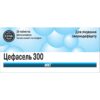
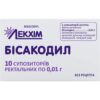

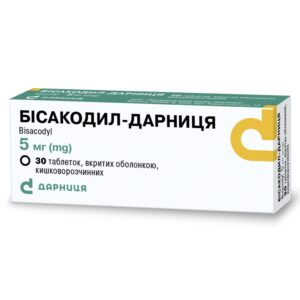

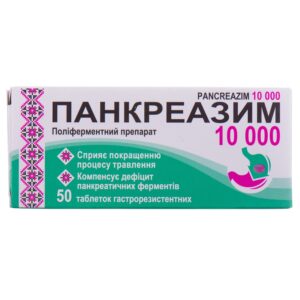
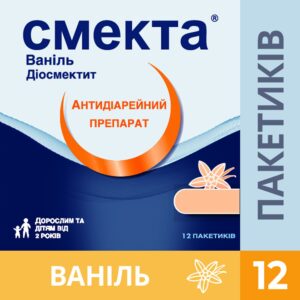
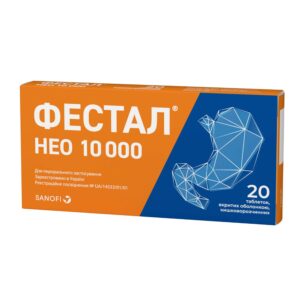
Reviews
There are no reviews yet.